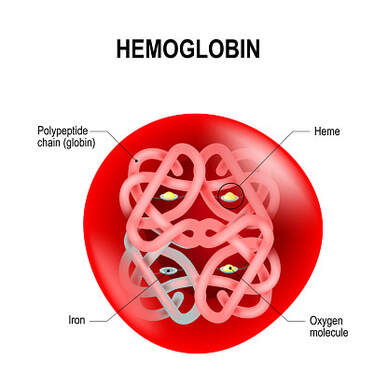
Hemoglobin is found in your red blood cells. It is a protein your body makes from iron, and is what holds oxygen to transport it around your body to cells and organs.
How do I get the iron my body needs to make hemoglobin?
Food is the best source of the iron your body needs to make hemoglobin. Remember being told as a kid you should eat liver? Well, pregnancy is the time to take that advice. For those who just can't handle liver (including me), red meat such as beef, buffalo, venison etc are the next best source. Dark chocolate is a good source too. The darker the chocolate, the higher the iron content. Lots of foods have iron, so read labels and do some research online. Be mindful that calcium will block iron absorption, so if you are needing to increase your hemoglobin, think twice about adding cheese to your hamburger. On the other hand, Vitamin C will increase iron absorption so you can feel good about enjoying some dark chocolate covered strawberries. Make sure you have are getting folate since iron needs this as well as Vitamin C to do its job. If your iron has dropped at around 30 weeks gestation, good job expanding your blood volume! You have time to get your hemoblogin back up to a healthy level before birth.
What should my hemoglobin level be?
In the first prat of pregnancy, hemoglobin levels should be 12-15 g/dL. As your blood volume expands, this number drops, usually by 2 g/dL. This drop is due to your iron being diluted by the increased amount of blood in your body. I prefer my clients have a hemoglobin level of at least 11 g/dL before the baby is born. This will help Mom handle blood loss from birth well and lets baby build iron stores. Iron transport accross the placenta to your baby is highest in the last 4 weeks of pregnancy.
How will I know if my hemoglobin levels are low?
You may notice fatigue, brittle nails, pale skin, dizziness, shortness of breath and heart palpitaiton or rapid pulse. I like to check hemoblogin at around 30 weeks gestation so we can see how much of a change there is, and so there is time to get it back into a healthy range.
What should I do if my hemoglobin levels are low?
I recommend my clients focus on iron rich food while being mindful that sources of calcium will block absorption and vitamin C will increase absorption. Depending on what lab work indicates, I sometimes recommend supplemental forms of iron and sometimes Folate to help raise levels. It takes about 2 weeks before any increases will shop up in labwork, although often clients will notice an increase in energy, or a lower heartbeat after just a few days of working to raise iron levels. Depending on how much the level has dropped and how a client is feeling after working to raise levels, I may check it again around 36-37 weeks gestation.
Hemoglobin is critical for your baby, and for your body. I expect hemoglobin to drop in pregnancy, and I actually find it more concerning when the level doesn't drop. Monitored through your pregnancy, hemoglobin levels are very easy to address with simple changes in diet.

 RSS Feed
RSS Feed